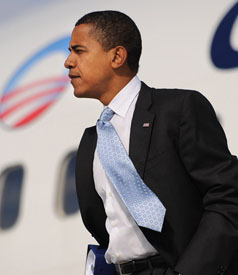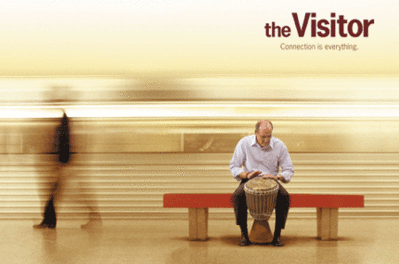
"And like almost everyone else, he’s got it wrong.
"The original Europeans in the
"And like those states the
"Like those places, the
"It is just another place where white colonists arrived, seized the land, and dispossessed, exterminated or attempted to exclude the original 'non-white' peoples – all of them.
"They did so at the point of a gun - by open terror and genocide, which was the precursor and the necessary pre-condition of European immigration. And, of course, they didn’t only use guns and overt terror. Where 'necessary,' they operated by 'law.'"
http://the-fourth-world.blogspot.com/2006/08/immigration-nation-of-colonists-and.html
Then the Information Clearing House sent along a cheery little suppressed speech by a surviving member of the Wampanoag tribe, who were the people that "helped" the Puritans through that first killer winter at the Plymouth--uh--Plantation. You may have read this already or know about it but it seems in 1970, the Massachusetts Department of Commerce wanted to have a big 350th Anniversary celebration of the First Thanksgiving. They located a Wampanoag named Wamsutta---or as he is know around there, Frank. B. James. He agreed to give the keynote address...but the Department asked to read it first. When they did Wamsutta was sent to the back of the bus, and somebody else told the assembly what they wanted to hear. His written draft still is around and starts like this~~~
"I speak to you as a man -- a Wampanoag Man. I am a proud man, proud of my ancestry, my accomplishments won by a strict parental direction ('You must succeed - your face is a different color in this small Cape Cod community!'). I am a product of poverty and discrimination from these two social and economic diseases. I, and my brothers and sisters, have painfully overcome, and to some extent we have earned the respect of our community. We are Indians first - but we are termed 'good citizens.' Sometimes we are arrogant but only because society has pressured us to be so.
"It is with mixed emotion that I stand here to share my thoughts. This is a time of celebration for you - celebrating an anniversary of a beginning for the white man in America. A time of looking back, of reflection. It is with a heavy heart that I look back upon what happened to my People.
"Even before the Pilgrims landed it was common practice for explorers to capture Indians, take them to Europe and sell them as slaves for 220 shillings apiece. The Pilgrims had hardly explored the shores of Cape Cod for four days before they had robbed the graves of my ancestors and stolen their corn and beans. Mourt's Relation describes a searching party of sixteen men. Mourt goes on to say that this party took as much of the Indians' winter provisions as they were able to carry."
http://www.informationclearinghouse.info/article21333.htm
Then I went over to Time Magazine and read Joe Klein's appraisal of George Bush as the lamest duck ever. If I was looking to get cheered up, I probably shouldn't have done this.
"In the end, though, it will not be the creative paralysis that defines Bush. It will be his intellectual laziness, at home and abroad. Bush never understood, or cared about, the delicate balance between freedom and regulation that was necessary to make markets work. He never understood, or cared about, the delicate balance between freedom and equity that was necessary to maintain the strong middle class required for both prosperity and democracy. He never considered the complexities of the cultures he was invading. He never understood that faith, unaccompanied by rigorous skepticism, is a recipe for myopia and foolishness. He is less than President now, and that is appropriate. He was never very much of one."
http://www.time.com/time/nation/article/0,8599,1862307,00.html
Speaking of the markets, Paul Krugman spent Thanksgiving dashing off his analysis of why-didn't-anyone-see-this-coming, and it's in this morning's Times.
"A few months ago I found myself at a meeting of economists and finance officials, discussing — what else? — the crisis. There was a lot of soul-searching going on. One senior policy maker asked, 'Why didn’t we see this coming?'
"There was, of course, only one thing to say in reply, so I said it: 'What do you mean "we," white man?'...
"Some people say that the current crisis is unprecedented, but the truth is that there were plenty of precedents, some of them of very recent vintage. Yet these precedents were ignored. And the story of how 'we' failed to see this coming has a clear policy implication — namely, that financial market reform should be pressed quickly, that it shouldn’t wait until the crisis is resolved."
http://www.nytimes.com/2008/11/28/opinion/28krugman.html?_r=1&th&emc=th
Last month Jim Hightower went even further and lined up his suspects against the wall for identification. Hightower's not an economist I think, but he knows the value and power of a buck. http://en.wikipedia.org/wiki/Jim_Hightower The article must have gone up on Halloween, but I didn't see it until today---which I am recalling now is called Black Friday. Gloom.
"You don't have to be in Who's Who to know What's What, do you? The fundamentals are NOT sound.
"Wall Street and Washington (excuse the redundancy there) want us commoners to believe that this viral spread of economic grief was caused by those lower-income homeowners who couldn't pay their subprime loans--merely an unforeseeable glitch in a complex and otherwise healthy financial system. Hogwash. The source of today's pain is the same as it was in America's previous financial collapses: the unbridled greed of economic elites, enabled by their political courtesans in Washington.
"This unbridling has been the long-sought goal of a cabal of deregulation ideologues who dwell in laissez-fairyland. During the past two decades, they have relentlessly pushed their economic fantasies into law. Their theory was that (to use Ronald Reagan's simple construct) 'the magic of the marketplace' would create an eternal rainbow of prosperity through financial 'innovation'--if only the market was unshackled from any pesky public regulations. What the dereg theorists missed, however, is that magicians don't perform magic. They perform illusions."
http://www.hightowerlowdown.org/node/1801
Which brings us to the President-elect and his appointments thus far. This man carries around a lectern with him that says "The Office Of The President-Elect." I guess that's kind of clever because as long as he's not in the Oval Office yet, his office is wherever he shows up. But the sign also implies a president-elect is an "office" in government of some kind, a position of elected power, an indication he's only being polite by not taking over right away. In other countries defeated leaders are just swept out. Many economists are saying that's what should happen here, the crisis is too great to hang around for 2 months while the current guy does nothing. So Obama has been announcing who's going to be doing what, and holding press conferences to do so. On Wednesday he finally was asked, "Where's the change you talked about?" The President-elect seemed a bit sharp in his response.
"President-elect Barack Obama essentially said Wednesday that he is the change, striving to assure Americans that he'll shake up Washington despite filling his administration with old hands from the Clinton administration and the capital's corridors of power.
"'Understand where the vision for change comes from, first and foremost,' Obama said. 'It comes from me. That's my job, is to provide a vision in terms of where we are going, and to make sure, then, that my team is implementing.'"
http://www.mcclatchydc.com/251/story/56578.html
The Boston Globe maybe fired the first shot, heard at least as far as Ohio, by going a bit further into the story.
"However, liberal activists contend that Obama so far has gone too far in one direction, bringing in too many of the same Washington insiders and undermining his own message of change. Obama, they complain, hasn't given a top cabinet job to a true liberal, and grumble about the expected appointments of rival Hillary Clinton -- a centrist Democrat -- as Obama's secretary of state and of Robert M. Gates, a Republican appointed by President Bush, to stay on as defense secretary for at least a year.
"'I'm not in the camp that says, "Give him a chance, because his vision will dominate,"' said Tom Hayden cq, a high-profile liberal and antiwar activist who said he supports Obama despite misgivings over his cabinet picks. 'I don't know what he's doing. This is not governing from the center. This is governing from the past.'
"Liberal bloggers, who helped fuel Obama's grassroots fund-raising and volunteer armies, are particularly vocal in their critique of Obama's choices so far.
"Some of them argue that competence and experience aren't substitutes for the right ideology. 'How can selecting only pro-war Cabinet members and advisers be justified on the grounds of "competence' -- as though one's support for the War has nothing to do with competence?' asks blogger Glenn Greenwald, who also writes for the online journal Salon.
"Since he was elected three weeks ago, Obama has tapped several people who worked for President Clinton, including Rahm Emanuel as his chief of staff and Lawrence Summers as his senior economic adviser. Reports say that the president-elect has settled on at least two other Clinton-era officials -- Eric Holder for attorney general and New Mexico Governor Bill Richardson for commerce secretary.
"Criticism of Obama's personnel picks, however, intensified when word leaked out that he will select Clinton as secretary of state. Antiwar activists decried her vote in favor of the 2003 Iraq invasion, which Obama hammered her about during the Democratic primaries. And after reports Tuesday that Obama would keep Gates at the Pentagon, some suggested it could mean Obama was reconsidering a campaign pledge to withdraw US combat troops from Iraq within 16 months of taking office."
http://www.boston.com/news/politics/politicalintelligence/2008/11/obama_answers_l.html Good comments too.
Ramzi Kysia, an Arab-American writer at Counterpunch, on Monday went so far as to assemble a list of people Obama should have appointed...if he truly believed in progressive change. His list follows this beginning~~~
"I feel cheated. I feel betrayed. And I’m not even a Democrat.
"Our nation hasn’t yet finished counting all the election returns, but the outlines of a future Obama Administration are already clear: Clinton at State, Geithner at Treasury, Summers to head the National Economic Council, Holder at Justice, Emmanuel as Chief of Staff, General James Jones as the likely National Security Advisor, and Robert Gates likely to stay on at Defense.
"There not a progressive among them. Not even one. If Obama was vague about his personal politics during the primaries and general election it was for a reason: he doesn’t have any.
"I’m not sure what I honestly expected, but I know it wasn’t this."
http://www.counterpunch.com/kysia11242008.html
But then I looked at the Thanksgiving Day edition of the Chicago Sun-Times, and there's the Obama family continuing its 4-year tradition of handing out food to the needy on the preceding Wednesdays. Hope stirred in my sinking breast.
"President-elect Barack Obama and his family spent an hour handing out chickens, potatoes, bread and other Thanksgiving food to poor families on Chicago's South Side Wednesday morning after Obama introduced his latest economic advisors. Then he shook hands with Catholic grade school students ecstatic to see him.
"Many of the poor and homeless -- some of whom come for food every Wednesday -- screamed in disbelief as they entered the parking lot of St. Columbanus church at 71st and Calumet and realized the reason they had been wanded by the U.S. Secret Service was because Obama, his wife and daughters, were standing there ready to pass out the food usually handed out by volunteers.
"'At Thanksgiving, it's important for us to remember people in need,' Obama said. 'They told me the number of people coming here is up 33 percent from last year.'
About 600 families got food, said Kate Maehr, executive director of the Greater Chicago Food Depository. That's up from 270 families last year, said the Rev. Matt Eyerman.
http://www.suntimes.com/news/politics/obama/1300994,Obama-food-pantry-112608.article




